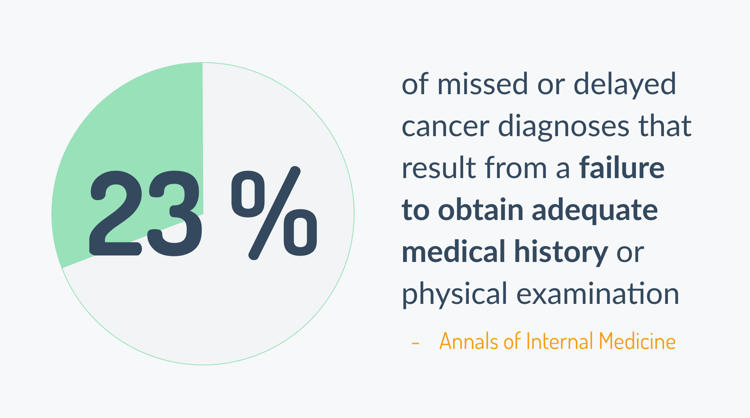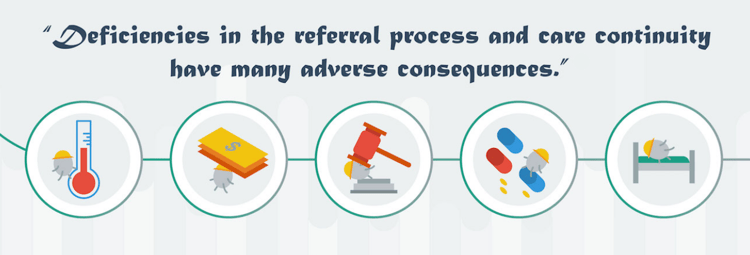
Healthcare practitioners want to provide the best care for their patients both during and after office visits. But one major stumbling block is that the majority of physicians in the United States aren’t capable of sharing information electronically outside of their practices. Data shows that the majority of primary care practices are struggling to seamlessly share patient information, efficiently manage referrals, and facilitate interoperable communication with specialist partners.
The US healthcare system is stuck in the dark ages
A 2015 Health Affairs study polled over 11,000 physicians around the world regarding interoperability. The results showed that primary care physicians in the United States are stuck in the dark ages.
Nearly 60% of PCPs within the American healthcare system are not able to electronically exchange patient clinical summaries with doctors outside their practice [1].
Additionally, a government survey of 2,655 hospitals found that nearly 60% of them can’t send or receive secure electronic messages to and from outside organizations. The United States lags far behind countries like Norway and New Zealand, where only 18% and 25%, respectively, can’t share.
The US Centers for Medicare and Medicaid Services (CMS) is trying to rectify interoperability problems. Notably, at the beginning of 2016, 90% of electronic health records (EHR) companies signed a pledge to implement federally recognized interoperability standards, help consumers access their electronic health information, and refrain from data blocking. But pledges alone are not going to enable easy exchange of electronic information between two systems.
FHIR is not a cure-all

Some believe that the solution to sharing patient health information will arise when national interoperability exchange standards are finalized. Today, a lot of focus and attention is on the interoperability standard called Fast Healthcare Interoperability Resources (FHIR). One commentator has even claimed that FHIR will revolutionize medicine the same way that ATMs revolutionized banking.
FHIR is a new healthcare data standard that has query/response properties. In other words, it allows EHRs to talk to other EHRs. Currently, most EHRs can only send information to other EHRs over secure protocols such as Direct secure messaging (DSM) or HL7. DSM has many limitations, especially for referral management because it does not provide referral tracking at every step of the referral process.
With FHIR, one EHR system can ask for specific data from another EHR (query) and the other EHR can share the information (response). FHIR establishes an Application Programming Interface (API) for exchanging electronic health records. However, even if FHIR standards help with EHR communication, it’s not yet a complete specification. According to an article in Forbes it will not even be finalized and unveiled until 2017 and “[i]t will be 2-3 years after that date that we see adoption beyond early innovators/adopters.”
It’s important to note that FHIR will also not solve every emerging need for electronic health information exchange. It is “not a revolution to what interoperability should and could become,” partly because FHIR, just like HL7, is not well suited to send messages to multiple endpoints and locations.
It’s not reasonable for practices to wait for an imperfect interoperability standard that will not arrive for many years. The healthcare reimbursement system is undergoing enormous changes right now with the shift towards value-based care. Practices need solutions now to prepare for regulations that will apply to performance starting in 2017 under the currently proposed MACRA regulations.
Consequences when information is not shared outside of your practice

The inability to share information outside of an organization is harmful to the practice and the patient.
Lack of data interoperability leads to poor continuity of care, suboptimal primary and specialty care, and a laundry list of dire consequences such as:
- 23% of missed or delayed cancer diagnoses result from a failure to obtain adequate medical history or physical examination [2]
- 30% of missed or delayed medical diagnoses are due to communication factors such as handoffs and failure to establish clear lines of responsibility [2]
- In one example, a patient became severely ill from several infections due to an immunocompromised state that had been diagnosed a few years earlier, but was only documented in a separate medical system’s EHR that was not connected to other providers’ EHR systems
- Up to 90% of colorectal cancer deaths are preventable with early detection, but 40% of patients who don’t complete colonoscopies encounter system barriers such as paperwork or telephone challenges
- 24,000 people with diabetic retinopathy go blind each year, early detection and treatment can reduce the risk of blindness by 95% , but Ophthalmologist appointment adherence is lower when PCPs don’t communicate with Ophthalmologists

- Higher hospitalization and emergency room usage [3]
- Increased risk of malpractice suits [4]
- Unnecessary duplication of medical testing, which can be invasive and risky to the patient [4]
- Too many medications from multiple providers [4]
- Inappropriate re-referrals [4]
When information can’t be shared outside of physician practices, patient care suffers. Practitioners need to successfully solve these problems and adopt systems that allow seamless communication of records and care transition information. Systems that keep PCPs and specialists on the same page about every patient.
How did a large, independent primary care practice achieve referral management interoperability with over 250 independent and employed specialist physicians?
Genesis Medical Associates is an innovative practice of over 40 primary care providers with offices throughout the northern suburbs of Pittsburgh. Dr. Karen Schogel MD FACP is one of the Genesis Internists who collaborated with Treatspace to launch an online referral management application.
 Dr. Karen Schogel gets it. With electronic referral management, Dr. Schogel’s practice is connected and interoperable with her practice’s preferred specialist partners. Every time she refers a patient to a specialist, the specialist’s office knows about it and follows up with the patient to schedule an appointment. If the patient doesn’t schedule the appointment with the specialist, Dr. Schogel’s office will know about it and follow up with the patient.
Dr. Karen Schogel gets it. With electronic referral management, Dr. Schogel’s practice is connected and interoperable with her practice’s preferred specialist partners. Every time she refers a patient to a specialist, the specialist’s office knows about it and follows up with the patient to schedule an appointment. If the patient doesn’t schedule the appointment with the specialist, Dr. Schogel’s office will know about it and follow up with the patient.
When the patient has his/her appointment with the specialist, the specialist has all the information needed from Dr. Schogel to provide optimal care, including transition of care (TOC) documentation and office notes from Dr. Schogel’s EHR system. If the specialist needs any more important patient or referral information, the office can quickly and easily send a secure message to Dr. Schogel’s office through the referral management application. This efficient communication happens without having to scramble at the last minute, play phone tag or wait for documents to be faxed in.
After the specialist appointment, the specialist can quickly and easily send a consult report back to Dr. Schogel’s office in time for the patient’s follow-up appointment.
Dr. Schogel and her specialists are referral interoperability champions because they use a referral management solution that meets their needs and the needs of their patients. At the HIMSS conference in 2016 Andy Slavitt, the acting administrator of CMS, emphasized that problems with interoperability often equate to “I can’t track my patient’s referral.” With an online referral management platform, referral and patient information gets to the right practitioner at the right time so that practices focus more on patient care and less on administrative work.
Be more like Dr. Schogel. Take the lead in high-performance referral management and schedule a time to discuss whether Treatspace can help your organization effectively manage referrals to prepare for upcoming regulations and maximize reimbursement.
[1] Health Affairs | http://content.healthaffairs.org/content/34/12/2104.full
[2] Annals of Internal Medicine | http://www.ncbi.nlm.nih.gov/pubmed/17015866
[3] Milbank Quarterly | http://www.ncbi.nlm.nih.gov/pmc/articles/PMC2690145/
[4] Milbank Quarterly | http://www.ncbi.nlm.nih.gov/pubmed/21418312


